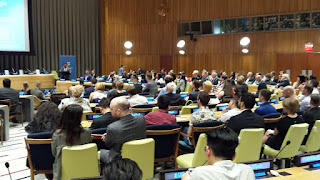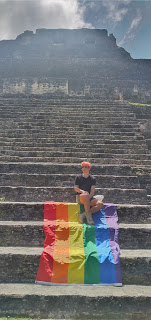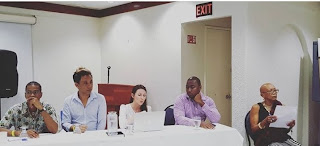CSO Containment or Complicity: PANCAP as a Regional Mechanism
11th October, 2018
HIV/AIDS LAC
https://www.avert.org/professionals/hiv-around-world/latin-america/overview
2011 data for LAC
https://www.ncbi.nlm.nih.gov/pmc/articles/PMC3142155/
Religious news
https://religionnews.com/2018/07/20/trinidad-and-tobagos-religious-leaders-call-on-government-to-uphold-anti-lgbt-laws/
An estimated 1.86 m people are living with HIV in Latin America and the Caribbean. L.A.C countries has spend $1.59B up to 2011. In 2017, The Caribbean region estimated that 310,100 persons were living with HIV and there were 15,000 new infections and 10,000 deaths. With 11 of the 16 countries in the Caribbean relying heavily on external foreign funding, no ideas of the mortality rates of men who have sex with men, no study on the economic loss of loosing 200,000 people in the region in the course of the epidemic, discussions, have been going in circles about addressing human rights violations.
While the region, must be applauded for setting up PANCAP to address a health response, as a mechanism to address human rights concerns for L.G.B.T, Sex workers, substances users, prisoners, it has not have much luck advancing the substance of rights. We know that Jason Jones case was not supported by Global Fund Process and that section 53 did not begin within the PANCAP process. In fact, discussion of advancing comprehensive sexuality education, age of consent and violence and discrimination protections which started 20 years ago have seen no significant traction at the national level. Young people from Belize, Jamaica, Barbados,the Dominican Republic spoke of representations in policy places, but built no structure to act as pressure points in the region. C.S.O's are asked to document, but not given the resources to investigate and support the penalization of perpetrators of acts of violations.The result is a regional culture of tokenism and complicity in regional interventions that is viewed as a short-term investment rather than a long-term action to advance systemic change.
The pillars of regional leadership, Civil society and key populations have been affected by a power structure in the region that have stagnated progress on human rights. The expectation to have the rat to mind the cheese is to expect parliamentarians to advance rights when their entitlement of power super cedes the reality that its key populations that must lead in agitating for advancement of rights at the national level and challenge the political structure to, do their jobs.
Civil Society we were told is weak, busy advancing liberation framework that involve knowledge transfer, exchange of information and personal development. But C.S.O's seem to have become complicit as critical thinking of accessible justice, offering observations of systemic challenges of justice and making recommendations for improvements was sorely lacking at the C.S.O regional meeting in Jamaica. C.S.O's ability to function as an effective lobby or to advance political pressure, remains a cause for concern. C.S.O's have become silent advocates looking for a hands out.
Administratively, PANCAP has focus on liberation framework in HIV, but has not looked at HIV, sufficiently,through a Civil Rights lens. While it must be acknowledge that the SIDS data base has been recognized as a valuable tool and investments have been made to work with the University of the West Indies Rights Advocacy Project. The Global Fund process is managed in cycles of 3 years, as a result, any serious commitment to advance key population civil rights concerns will remain lacking for years to come.
Lastly, key populations have a long history of complicity in their own mistreatment. As the principle of self-determination is followed and respected, the ability to hold perpetrators of violence and discrimination accountable remains a fundamental challenge. With the lack of political leadership, C.S.O silo practices, administrative limitations and key population failure to act as a pressure group to demand systemic change the Caribbean Region HIV response stuck in the foreseeable future.
PANCAP was created to "provide a structured and unified approach" and"to maximize efficient use of resources and increase impact, mobilizes resources and build capacity of partners." But how has this translated in 30 years of the epidemic in the region. Leaders in the region has shown no serious interest in addressing stigma and discrimination impacting the men who have sex with men and sex workers. Preferring to secure their entitlement to power than serving the region's citizenry civil rights concerns at the national level. PASTOR Winston Mansingh, a PANCAP Champion for change makes the point very clear when he said, "“... we believe strongly that the push for gay rights is a separate kind of rights... There is a very, very strategic, well-thought-out plan to camouflage gay rights within human rights,” on July 30th, 2018 article in religious news. Political hypocrisy remains alive and well in the HIV response in the Caribbean. Though it was established by a Declaration of CARICOM Heads of Government on 14 February 2001 in response to the threat of HIV to sustainable human development."
The result has been ignoring the Montevideo Consensus Document, watering down language of rights in the UN Commission on the Status of Women document, a watering down of the justice for all plan of action, retention of laws that criminalizing same sex intimacy, unequal application of socio-economic rights of sex workers and men who have sex with men and a conservative position on how substance users should be treated at the national level. PANCAP own achievements points out that stigma and discrimination and human rights has not been a priority.
The result has been ignoring the Montevideo Consensus Document, watering down language of rights in the UN Commission on the Status of Women document, a watering down of the justice for all plan of action, retention of laws that criminalizing same sex intimacy, unequal application of socio-economic rights of sex workers and men who have sex with men and a conservative position on how substance users should be treated at the national level. PANCAP own achievements points out that stigma and discrimination and human rights has not been a priority.
Since the inception of the PANCAP in 2001, claims of notable successes as stated in the 2015 UNAIDS Global Report:
- A decline in overall regional prevalence from 2.2 % to less than 1%;
- Sharpest regional reductions in HIV incidence by 49%;
- Declining AIDS-related deaths by 52% from 24,000 deaths in 2001 to 11,000 deaths in 2012;
- Anti-retroviral coverage increased to over 52% from 5% of the eligible population in 2001;
- Virtual elimination of mother-to-child transmission in some countries; the region is poised to become the first region of the world to achieve elimination, with Cuba already achieving the target.
- Countries have been strengthened with improved capacity to implement prevention, treatment, and care interventions for which Member States are to be commended.
- Substantial investments have been made in strengthening health systems and in scaling up services for on-going care and support for increasing numbers of people. Consequently people with AIDS are living longer and are now being affected by non-communicable diseases (NCDs).
- Regional public goods and services delivered by support agencies have lowered transaction costs, relieving the burden on the economies of small states, and have reduced the inefficiencies inherent in individual countries by building capacity in the same areas.
It new strategic issue identified ," Addressing structural barriers (policy and legislation) that impede vulnerable people’s access to services through Justice for All led by United Nations Secretary-General Special Envoy for HIV in the Caribbean." Ignoring that it was right-wing ideology that undermine serious Civil rights commitment to act in the region. Jason Jones and section 53 cases can be argued as cases that started independent of its new strategic thinking. Making the point that addressing stigma and discrimination is is not a unified approach, but driven through organic actions of ordinary citizens.
It is interesting to note that its intellectuals who have driven the technical process, persons in positions of political power that has shaped the narrative about approaches in the region. These people represent persons in places of privilege, who do not experience the pain of discrimination. but who dictate strategic interventions, who set the tone about strategic intervention who decides how human rights is approached. I argue that they serve the self-interest of positioning and have created a culture of complicity. I argue that ideology, complicity and culture of liberation intervention have stifled innovation in the region which failed to balance a liberation framework with Civil Rights interventions. Proof cannot be the SID database, our relationship with U.R.A.P or E.C.A.D.E effort. The latter has been driven by private foundation. It was said that the region does recognize the value of civil rights concerns, but recognition is not the same as serious action that include budget allocations across countries. What the future brings is anyone guess, but I do know, that change will be driven by rebellious activists on the ground.
HIV/AIDS LAC
https://www.avert.org/professionals/hiv-around-world/latin-america/overview
2011 data for LAC
https://www.ncbi.nlm.nih.gov/pmc/articles/PMC3142155/
Religious news
https://religionnews.com/2018/07/20/trinidad-and-tobagos-religious-leaders-call-on-government-to-uphold-anti-lgbt-laws/









Comments
Post a Comment